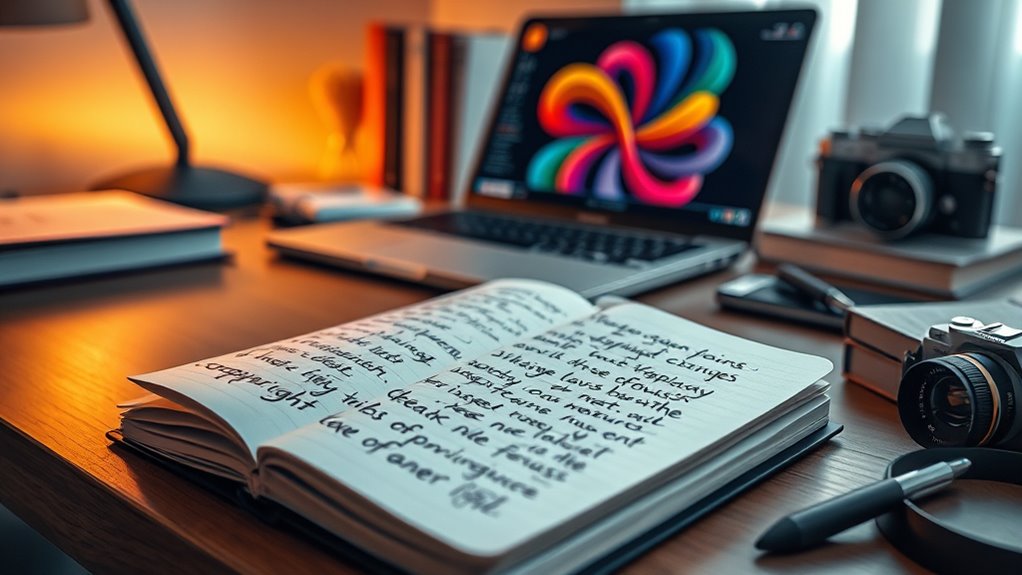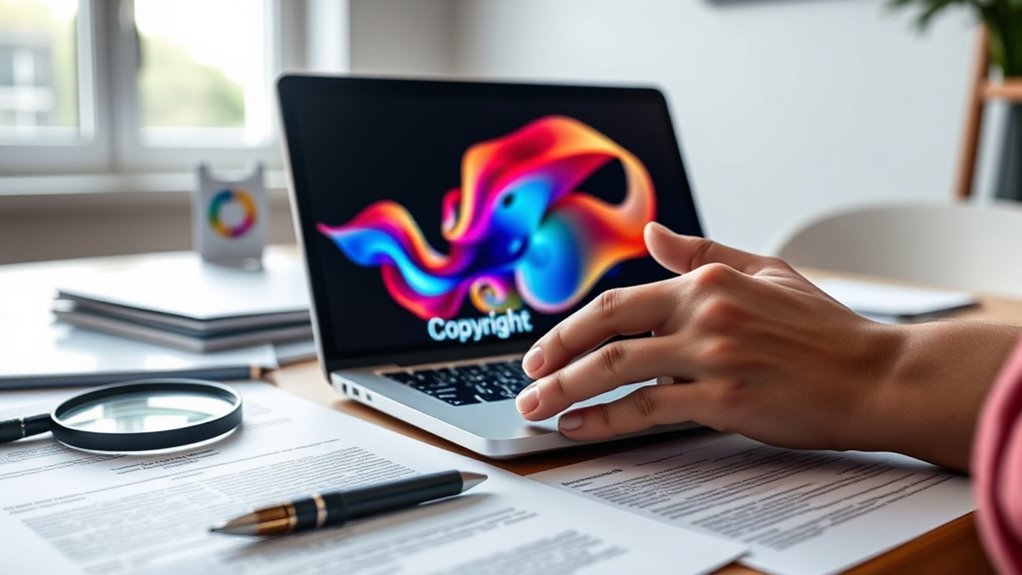To safeguard your content, you need to understand copyright basics, which give you legal rights over your creative works. This includes knowing about fair use, moral rights, and how licensing and marking your work can clarify sharing rules. Registration isn’t required but can strengthen your protection. Balancing your rights with public interest ensures your work remains protected while fostering responsible sharing. Keep exploring to learn how to effectively defend and manage your creative property.
Key Takeaways
- Understand that copyright grants legal rights to control, reproduce, and distribute your creative works.
- Use fair use guidelines to share content responsibly without permission in commentary, critique, or citation contexts.
- Protect your work’s integrity and reputation by asserting moral rights, including attribution and objecting to modifications.
- Register your works and clearly mark them with copyright notices to strengthen legal protection and facilitate enforcement.
- Balance your rights with public interest by utilizing licensing options and respecting fair use to promote responsible sharing.

Have you ever wondered what copyright means for your creative work? Understanding copyright is essential because it grants you legal rights over your creations, allowing you to control how they’re used and shared. But copyright isn’t just about protection; it also involves considerations like fair use and moral rights protections. These elements shape how others can interact with your work and what limitations might exist, so getting a clear grasp of them is vital for any creator. Additionally, understanding the flat iron bike market can help you navigate licensing and usage rights if you incorporate such elements into your projects. Fair use considerations come into play when others want to use parts of your work without your permission. For example, if someone cites a brief excerpt for commentary or critique, they might be justified under fair use, depending on the purpose, amount used, and impact on your market. Recognizing these considerations helps you understand when your work might be legally shared or referenced without infringing on your rights. It doesn’t mean you lose control, but it clarifies the boundaries and encourages fair, responsible use of creative content. Moral rights protections are equally important but often overlooked. These rights safeguard your personal connection to your work, ensuring that it isn’t altered or misrepresented in a way that could harm your reputation or integrity. Moral rights vary by country but generally include the right to attribution and the right to object to modifications that distort your original intent. As a creator, knowing that these protections exist means you can assert your moral rights if someone changes your work without your consent or misuses it in a way that damages your reputation. Both fair use considerations and moral rights protections highlight that copyright isn’t just about ownership—it’s also about balancing your rights with public interest and respecting your personal connection to your creations. While registering your work isn’t mandatory, doing so can strengthen your legal position if disputes arise. It’s also wise to clearly mark your work with copyright notices and licenses to communicate how others can use it.
Frequently Asked Questions
How Can I Prove Original Ownership of My Work?
To prove your original ownership of your work, start by registering your copyright, which provides official proof of authorship. Keep detailed records of your creation process, including drafts and timestamps. Using copyright registration enhances your legal standing if disputes arise, as it serves as concrete proof of originality and authorship. This official documentation is your strongest evidence when asserting your rights over your work.
What Are the Fair Use Limitations for Creators?
You might think fair use is a free-for-all, but it’s not. While transformative use and parody limitations give you some wiggle room, they don’t mean you can copy and claim it’s artsy. Fair use covers criticism, commentary, or parody, as long as your work adds new meaning. Remember, it’s a balancing act—use it wisely, or you might find yourself facing legal trouble.
How Do International Copyright Laws Differ?
International copyright laws differ because countries establish their own rules, but copyright treaties like the Berne Convention help. These treaties guarantee that your work receives protection across member nations, making international enforcement easier. You should be aware that enforcement varies, and some countries have stricter or more lenient laws. To protect your content globally, understand these treaties and stay informed about each country’s specific copyright regulations.
Can I Copyright Ideas or Just Expressions?
Your question is a mountain of a challenge, but here’s the scoop: copyright protects expressions, not ideas. Think of it like the concept vs. expression debate—your unique way of conveying an idea is protected, but the idea itself isn’t. If you want to safeguard your concept, you should explore other protections like patents. So, yes, ideas alone aren’t copyrightable, but your creative expression definitely is.
What Steps Should I Take if My Work Is Plagiarized?
If you find your work plagiarized, act quickly by documenting the infringement with screenshots or timestamps. You should then send a cease and desist letter to the infringer, demanding they stop using your content. Consider using digital watermarking on your work to deter future theft. If necessary, consult a legal professional to explore further options like filing a formal copyright complaint or pursuing legal action.
Conclusion
Now that you know the basics, protect your passions by practicing proper permissions and patent practices. Keep your creations clear of copyright conflicts by staying current and cautious. Confidence in your content’s copyright status can cultivate a culture of creativity and control. Remember, safeguarding your work isn’t just about legality—it’s about locking in your legacy, lighting the way for future freedom, and fueling your fierce, fearless creative fire. Protect passionately, and let your originality shine securely.










